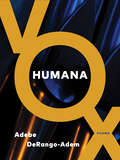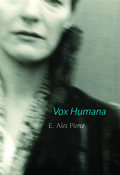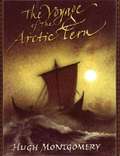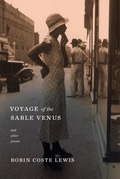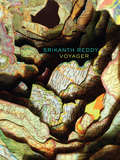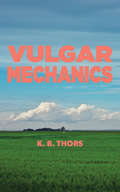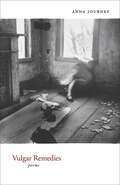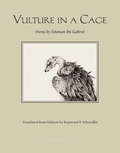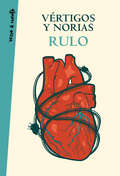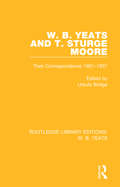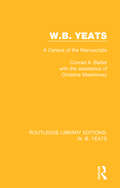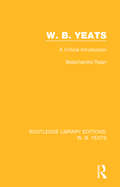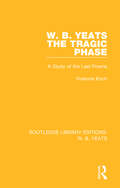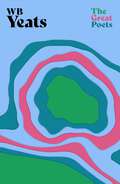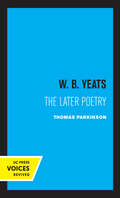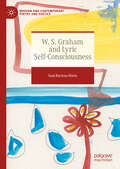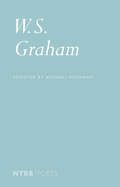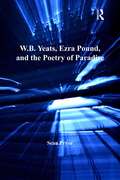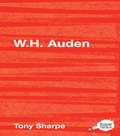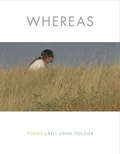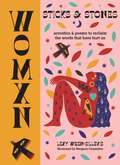- Table View
- List View
Vox Humana
by Adebe DeRango-AdemVox Humana (Latin for "human voice") is driven by a sense of political urgency to probe the ethics of agency in a world that actively resists the participation of some voices over others.In and through literary experiments with word and sound, utterance and song, Vox Humana considers the different ways a body can assert, recount, proclaim, thus underscoring the urgency of doing so against the de-voicing effects of racism and institutional violence.As the title also represents an organ reed that sounds like the human voice, so DeRango-Adem shares her reclaiming of the instrument traditionally accessed by the white establishment.These poems are born from the polyphonic phenomenon of the author's multilingual upbringing. They are autobiographical and alchemical, singular and plural, but, above all, a celebration of the (breath) work required for transformation of society and self.
Vox Humana
by E. Alex PiercePoems of great passion and tenderness, as close to rapture as a writer can get and still hold on. E. Alex Pierce's voice can be heard echoing down the long corridors of memory and myth. It's not that these poems live in the past; instead, they manage to bring it back to life with uncanny sensual details and an urgency that makes you realize some fires never really go out. Vox Humana is all lilt and discipline in its courtliness, its surrender to the theatre of the moment at its most alive.
Voyage of the Arctic Tern
by Hugh MontgomeryNarrated in stirring verse that demands to be read aloud, this epic adventure, full of atmospheric line illustrations, will appeal to all children and adults who love a thrilling story, memorably told. Things happen here in Plymouth in the winter, And of such things you'd surely never learn. So take your seat and listen while I tell you Of Bruno and his ship, The Arctic Tern. . . . Treason, treachery, and treasure - here is a classic seafaring tale that sweeps across the centuries and sails to different lands, from Spain to the southwest of England. At its heart is Bruno, the skipper of The Arctic Tern, who has been cursed to a life of eternal wandering after succumbing to a moment of greed and betrayal some thousand years ago. Bruno's quest for release brings him to the court of the King of Spain and into battle with an ancient adversary, the villainous pirate Mad Dog Morgan. Can Bruno and his crew set right the wrongs of the past and present? Will good triumph over evil? Can the captain of The Arctic Tern ever find the redemption that he seeks?
Voyage of the Sable Venus
by Robin Coste LewisA stunning poetry debut: this meditation on the black female figure throughout time introduces us to a brave and penetrating new voice.<P><P> Robin Coste Lewis’s electrifying collection is a triptych that begins and ends with lyric poems considering the roles desire and race play in the construction of the self. The central panel is the title poem, “Voyage of the Sable Venus,” a riveting narrative made up entirely of titles of artworks from ancient times to the present—titles that feature or in some way comment on the black female figure in Western art. Bracketed by Lewis’s autobiographical poems, “Voyage” is a tender and shocking study of the fragmentary mysteries of stereotype, as it juxtaposes our names for things with what we actually see and know. Offering a new understanding of biography and the self, this collection questions just where, historically, do ideas about the black female figure truly begin—five hundred years ago, five thousand, or even longer? And what role has art played in this ancient, often heinous story? From the “Young Black Female Carrying / a Perfume Vase” to a “Little Brown Girl / Girl Standing in a Tree / First Day of Voluntary / School Integration,” this poet adores her culture and the beauty to be found within it. Yet she is also a cultural critic alert to the nuances of race and desire and how they define us all, including herself, as she explores her own sometimes painful history. Lewis’s book is a thrilling aesthetic anthem to the complexity of race—a full embrace of its pleasure and horror, in equal parts.<P> Winner of the National Book Award
Voyager
by Srikanth ReddySrikanth Reddy's second book of poetry probes this world's cosmological relation to the plurality of all possible worlds. Drawing its name from the spacecraft currently departing our solar system on an embassy to the beyond, Voyager unfolds as three books within a book and culminates in a chilling Dantean allegory of leadership and its failure in the cause of humanity. At the heart of this volume lies the historical figure of Kurt Waldheim--Secretary-General of the U.N. from 1972-81 and former intelligence officer in Hitler's Wehrmacht--who once served as a spokesman for humanity while remaining silent about his role in the collective atrocities of our era. Resurrecting this complex figure, Reddy's universal voyager explores the garden of forking paths hidden within every totalizing dream of identity.
Vrajanatha Vadajena
by Janaki Ballabha MohantyOn the life and works of Oriya Poet Vrajanatha Vadajena.
Vulgar Mechanics
by K. B ThorsGrappling with queerness and trauma from Alberta to Brooklyn, powering through body, sex, and gender to hit free open roads <P><P> In Vulgar Mechanics, K. B. Thors seeks to invent new strategies for survival through the two most basic tools available to the speaker: language and the body. The work begins in collapse, the poems acting as witness to the death of a mother. The speaker documents how, as her mother's physical body disintegrates, hidden knowledge rises to the surface in the form of "seismic legacy data." As dark secrets are released, the desire for justice demands improvisation. Moving from the fracked landscapes of the prairies to the steep verticality of New York, this is a collection concerned with hunger, anger, and the shifting fault-lines between play and pain. The poems celebrate the body as a vehicle of excavation and self-determination in a world in which there may be no such a thing as a safe word. <P><P>Thors pushes against the boundaries of language - the material of sense, meaning - in order to claim a quantum vision of the self, one who transforms trauma into energy through its own multiplicity. The body becomes both ghost and machine, burning the past in its engine to make something beautiful and new, "a thunder egg / bucking the fire pit."
Vulgar Remedies: Poems (Media & Public Affairs)
by Anna Journey"Anna Journey's poetry is really magical." -- David Lynch, director of Blue Velvet and creator of Twin Peaks"Anna Journey's second collection of poems is wonderful and brings something precise and wild out of a vivid night, an imagery that finds its own necessary music, like sudden isolated birdsongs at dawn. The multiplying shadows of the mind are made exterior here, surprisingly illustrated with anecdotal thought. And Dante no longer concludes that all lovers are martyrs. I'm so happy to have this work in my life." -- Norman Dubie, author of The Volcano"Anna Journey, in her new book of poems, Vulgar Remedies, creates an alchemical self whose shimmering limbic/alembic lyrics distill the mysterious terrors of childhood, the dangerous passions of adults, into her own honey-dusk 'voodun': protective, purified to gold. Poetry is always a time machine: here we are invisible travelers to a bewitched past, a beautifully occluded future. These poems are erotic, vertiginous, revelatory, their dazzling lyric force reflecting profound hermetic life." -- Carol Muske-Dukes, author of Twin Cities
Vulture in a Cage: Poems by Solomon Ibn Gabirol
by Raymond P. Scheindlin Solomon Ibn Gabirol"Vulture in a cage," Solomon Ibn Gabirol's own self-description, is an apt image for a poet who was obsessed with the impediments posed by the body and the material world to the realization of his spiritual ambition of elevating his soul to the empyrean. Ibn Gabirol's poetry is enormously influential, laying the groundwork for generations of Hebrew poets who follow him--rocky and harsh, full of original imagery and barbed wit, and yet no one surpassed him for the limpid beauty of his devotional verse. His poetry is at once a record of the inner life of a tormented poet and a monument to the Judeo-Arabic culture that produced him. This book contains the most extensive collection of Ibn Gabirol's poetry ever published in English.From the Trade Paperback edition.
Vértigos y norias
by RuloRulo se atreve por primera vez a ir más allá del universo de sus letras musicales y nos abre las puertas a su mundo interior a través de este libro repleto de textos, poemas y reflexiones. «La infancia es ese hogar que nunca podrás deshabitar». No somos más que niños en un parque de atracciones, un cúmulo de vértigos y norias, una aventura desordenada a la que a veces le falta argumento y otras le sobran giros de guion. Pero en ese imprevisto juego de azar está la gracia: sentir es un deporte de riesgo en el que no hay medidas de seguridad. Estas páginas componen un dibujo perfecto de esa apuesta que es vivir, de esa carrera de obstáculos que es latir cada día, de esa nostalgia y ese deseo que nos hacen caminar hacia delante sin olvidar el laberinto que nos trajo hasta aquí. En este libro, Rulo, cantante, compositor y uno de los grandes exponentes del rock español de las últimas décadas, se atreve por primera vez a ir más allá del universo de sus letras musicales y nos abre las puertas a su mundo interior a través de una gran variedad de textos, poemas y reflexiones fruto de sus experiencias y anécdotas rodadas a lo largo de miles de kilómetros con su furgoneta y tras los escenarios.
W. B. Yeats and T. Sturge Moore: Their Correspondence 1901-1937 (Routledge Library Editions: W. B. Yeats #2)
by Ursula BridgeThe letters in this book, first published in 1953, throw light on the literary scene at a time in which William Butler Yeats and Thomas Sturge Moore regularly corresponded. In the early days of their friendship Yeats and Sturge Moore often saw each other in London where they both played an active part in the literary and artistic scene. When Yeats later lived chiefly in Ireland and Sturge Moore spent much of his time in the country and abroad they met less often but kept in touch by letter. Many of these letters, and therefore a record of their friendship, has been preserved and presented in this book. This title will be of interest to students of literature and literary history.
W. B. Yeats: A Census of the Manuscripts (Routledge Library Editions: W. B. Yeats #1)
by Conrad A. Balliet Christine MawhinneyThis title, first published in 1990, is a census of the manuscripts of William Butler Yeats. The census includes not only his books, plays and poetry but also the whereabouts of many of Yeats’s letters and speeches, and will be of particular interest to students of literature. For further reading please refer to Conrad A. Balliet’s chapter ‘A Supplement to W. B. Yeats: A Census of the Manuscripts’ in Richard J. Finnerman’s (Editor) Yeats: An Annual of Critical and Textual Studies (Volume XIII, 1995, The University of Chicago Press).
W. B. Yeats: A Critical Introduction (Routledge Library Editions: W. B. Yeats #6)
by Balachandra RajanThis chief aim of this title, first published in 1965, is to present a comprehensive picture of Yeats’s achievement and some of the means for an evaluation of that achievement. To this end both the poems and plays have been examined and some of Yeats’s critical ideas have been briefly discussed. Professor Rajan’s study provides a compact introduction to Yeats’s work, and will be of interest to the general reader as well as to students of literature.
W. B. Yeats: A Study of the Last Poems (Routledge Library Editions: W. B. Yeats #5)
by Vivienne KochIn this study, first published in 1951, the author examines the poetry of Yeats’s last years, that poetry which reached and held to the ‘intensity’ which he had striven for all his life. Vivienne Koch explores the ways in which the great but troubled poems derive their energy from suffering, and examines thirteen of his last poems in detail, each with a slightly different focus. This title will be of interest to students of literature.
W. B. Yeats: An inspiring collection from one of Ireland’s greatest literary figures (The Great Poets)
by W.B. Yeats'Tread softly because you tread on my dreams' is one of the most well-known and repeated lines of poetry ever written. Less haunting, but still so relevant: 'Life is a long preparation for something that never happens.'W B Yeats was one of the foremost figures of 20th century literature. Winner of a Nobel prize, he was also a political figure, and, as is evident from his earlier work, fascinated by Irish folklore and the occult. He was also deeply affected by the First World War and the Anglo-Irish and Irish civil wars. It is a testament to the greatness of Yeats' poetry that he attempts to bear witness to these emotional and historical forces.This perfectly pitched collection includes some of the greatest poetry of the 20th century.
W. B. Yeats: An inspiring collection from one of Ireland’s greatest literary figures (The Great Poets)
by W.B. Yeats'Tread softly because you tread on my dreams' is one of the most well-known and repeated lines of poetry ever written. Less haunting, but still so relevant: 'Life is a long preparation for something that never happens.'W B Yeats was one of the foremost figures of 20th century literature. Winner of a Nobel prize, he was also a political figure, and, as is evident from his earlier work, fascinated by Irish folklore and the occult. He was also deeply affected by the First World War and the Anglo-Irish and Irish civil wars. It is a testament to the greatness of Yeats' poetry that he attempts to bear witness to these emotional and historical forces.This perfectly pitched collection includes some of the greatest poetry of the 20th century.
W. B. Yeats: The Later Poetry
by Thomas ParkinsonThis title is part of UC Press's Voices Revived program, which commemorates University of California Press’s mission to seek out and cultivate the brightest minds and give them voice, reach, and impact. Drawing on a backlist dating to 1893, Voices Revived makes high-quality, peer-reviewed scholarship accessible once again using print-on-demand technology. This title was originally published in 1964.
W. H. Auden in Context
by Tony SharpeW. H. Auden is a giant of twentieth-century English poetry whose writings demonstrate a sustained engagement with the times in which he lived. But how did the century's shifting cultural terrain affect him and his work? Written by distinguished poets and scholars, these brief but authoritative essays offer a varied set of coordinates by which to chart Auden's continuously evolving career, examining key aspects of his environmental, cultural, political, and creative contexts. Reaching beyond mere biography, these essays present Auden as the product of ongoing negotiations between himself, his time, and posterity, exploring the enduring power of his poetry to unsettle and provoke. The collection will prove valuable for scholars, researchers, and students of English literature, cultural studies, and creative writing.
W. S. Graham and Lyric Self-Consciousness (Modern and Contemporary Poetry and Poetics)
by Sam Buchan-WattsThis monograph considers the formal vitality of lyric in the face of anxieties about linguistic agency across the corpus of the British poet, W. S. Graham. A sophisticated modernist lyric originates, the book argues, in Graham’s rendering of self-consciousness at different strata across space, sound, image and form – as distinct from a more general lyric subject or ego. By listening closely to the poems, the book seeks to identify the self-sufficiency of Graham’s lyrics, and their ability to account for themselves theoretically on their own terms. Archival material – including worksheets, manuscripts and notebooks – is used to examine Graham's visual and spatial conception of verse and his ambivalent relation to verse form. Graham’s propositions are considered in the context of broader theoretical debates about modern lyric and a slipstream of mid-century poets (namely William Empson and Veronica Forrest-Thomson). The book concludes with a sustained analysis of Denise Riley's long-term engagement with Graham’s poetry, which suggests how Graham’s generative approaches to lyric can be further politicised.
W. S. Graham: Selected Poems
by Michael Hofmann W. S. GrahamAn original collection of the best and most provocative work by Scottish poet W.S. Graham, the celebrated author of "Nightfishing" and Malcolm Mooney's Land. “Does it disturb the language?” the Scottish poet W. S. Graham liked to ask about a poem. Graham’s do—strangely, comically, beautifully. His career fell into two parts. The early work is rapt and wild and incantatory, and culminates in the tour de force of 1955, The Nightfishing. Fifteen years of silence were then followed by an extraordinary late flowering: Graham’s poems became stark, quizzical, and unsettling, a continual teasing examination of thought and feeling that is also an ongoing investigation into the nature and power of poetry, work that is at once metaphysical and intimate, wry and elegiac. In these late poems, Graham emerges as one of the true originals of poetry in English.
W.B. Yeats, Ezra Pound, and the Poetry of Paradise
by Sean PryorEmphasizing the interplay of aesthetic forms and religious modes, Sean Pryor's ambitious study takes up the endlessly reiterated longing for paradise that features throughout the works of W. B. Yeats and Ezra Pound. Yeats and Pound define poetry in terms of paradise and paradise in terms of poetry, Pryor suggests, and these complex interconnections fundamentally shape the development of their art. Even as he maps the shared influences and intellectual interests of Yeats and Pound, and highlights those moments when their poetic theories converge, Pryor's discussion of their poems' profound formal and conceptual differences uncovers the distinctive ways each writer imagines the divine, the good, the beautiful, or the satisfaction of desire. Throughout his study, Pryor argues that Yeats and Pound reconceive the quest for paradise as a quest for a new kind of poetry, a journey that Pryor traces by analysing unpublished manuscript drafts and newly published drafts that have received little attention. For Yeats and Pound, the journey towards a paradisal poetic becomes a never-ending quest, at once self-defeating and self-fulfilling - a formulation that has implications not only for the work of these two poets but for the study of modernist literature.
W.H. Auden (Routledge Guides to Literature)
by Tony SharpeAs both a politically engaged and stylistically versatile poet, W.H. Auden is one of the most influential writers of the twentieth century. His work is not only widely studied and read, but has been used in musical scores and quoted in Hollywood films. This guide to Auden’s compelling work offers: an accessible introduction to the contexts and many interpretations of Auden’s texts, from publication to the present an introduction to key critical texts and perspectives on Auden’s life and work, situated in a broader critical history cross-references between sections of the guide, in order to suggest links between texts, contexts and criticism suggestions for further reading. Part of the Routledge Guides to Literature series, this volume is essential reading for all those beginning detailed study of W.H. Auden and seeking not only a guide to his works but also a way through the wealth of contextual and critical material that surrounds them.
WHEREAS: Poems
by Layli Long SoldierThe astonishing, powerful debut by the winner of a 2016 Whiting Writers' AwardWHEREAS her birth signaled the responsibility as mother to teach what it is to be Lakota therein the question: What did I know about being Lakota? Signaled panic, blood rush my embarrassment. What did I know of our language but pieces? Would I teach her to be pieces? Until a friend comforted, Don’t worry, you and your daughter will learn together. Today she stood sunlight on her shoulders lean and straight to share a song in Diné, her father’s language. To sing she motions simultaneously with her hands; I watch her be in multiple musics.—from “WHEREAS Statements”WHEREAS confronts the coercive language of the United States government in its responses, treaties, and apologies to Native American peoples and tribes, and reflects that language in its officiousness and duplicity back on its perpetrators. Through a virtuosic array of short lyrics, prose poems, longer narrative sequences, resolutions, and disclaimers, Layli Long Soldier has created a brilliantly innovative text to examine histories, landscapes, her own writing, and her predicament inside national affiliations. “I am,” she writes, “a citizen of the United States and an enrolled member of the Oglala Sioux Tribe, meaning I am a citizen of the Oglala Lakota Nation—and in this dual citizenship I must work, I must eat, I must art, I must mother, I must friend, I must listen, I must observe, constantly I must live.” This strident, plaintive book introduces a major new voice in contemporary literature.
WOMXN: Acrostics and Poems to Reclaim the Words that Have Hurt Us
by Lexy Wren-Sillevis"There are so many words, insults, labels and boxes for women to be packaged and packed off in. Often, but not always, they're words coined by men. Why that is, is a bigger conversation that is starting to be had by women everywhere. We're slowly, but oh-so-surely, making it clear that there is no man in womxn. We're writing him out and writing us back in, and we deserve a suffix all of our own that is free from patriarchal roots. So from here on in, we are WOMXN."Sticks and Stones is a powerful reclamation of the slurs and insults thrown at women for centuries. It's a righting of wrongs - a rewriting of sexist, belittling and shaming language. It's a tool for breaking free from the stereotypes and impossible standards used to confine women, transforming them into messages of resilience and resolve. And, most importantly, it's a rallying call for change, healing and empowerment.It takes the words, slurs, insults and labels that are used to diminish women every day and breaks them down and tears them apart. It transmutes and rewrites these words - sometimes with all of the pain they trigger, sometimes in the form of positive affirmations, mantras and poems - all told in acrostics.With their underlying meditative rhythms, these acrostics are also a remedy for healing wounds and empowering women to have the confidence to be their true selves. You can dip in and out, or read it cover to cover. You can come back to, and work through, any words that resonate with you. Lexy also offers clearing meditations at the back of the book to help you tackle the words that hurt you most, helping to remove them from your past, present and future.This title is illustrated by the hugely talented illustrator and print maker Margaux Carpentier. Margaux creates pictures using a symbolic language, so each piece has its own unique message for every individual. Her work is inspired by all the incredible colours of the world. She adapts her illustrations in 3D and large-scale murals, the most recent of which is currently on display in Brown Hart Gardens in Mayfair, London.
WOMXN: Acrostics and Poems to Reclaim the Words that Have Hurt Us
by Lexy Wren-Sillevis"There are so many words, insults, labels and boxes for women to be packaged and packed off in. Often, but not always, they're words coined by men. Why that is, is a bigger conversation that is starting to be had by women everywhere. We're slowly, but oh-so-surely, making it clear that there is no man in womxn. We're writing him out and writing us back in, and we deserve a suffix all of our own that is free from patriarchal roots. So from here on in, we are WOMXN."Sticks and Stones is a powerful reclamation of the slurs and insults thrown at women for centuries. It's a righting of wrongs - a rewriting of sexist, belittling and shaming language. It's a tool for breaking free from the stereotypes and impossible standards used to confine women, transforming them into messages of resilience and resolve. And, most importantly, it's a rallying call for change, healing and empowerment.It takes the words, slurs, insults and labels that are used to diminish women every day and breaks them down and tears them apart. It transmutes and rewrites these words - sometimes with all of the pain they trigger, sometimes in the form of positive affirmations, mantras and poems - all told in acrostics.With their underlying meditative rhythms, these acrostics are also a remedy for healing wounds and empowering women to have the confidence to be their true selves. You can dip in and out, or read it cover to cover. You can come back to, and work through, any words that resonate with you. Lexy also offers clearing meditations at the back of the book to help you tackle the words that hurt you most, helping to remove them from your past, present and future.This title is illustrated by the hugely talented illustrator and print maker Margaux Carpentier. Margaux creates pictures using a symbolic language, so each piece has its own unique message for every individual. Her work is inspired by all the incredible colours of the world. She adapts her illustrations in 3D and large-scale murals, the most recent of which is currently on display in Brown Hart Gardens in Mayfair, London.
